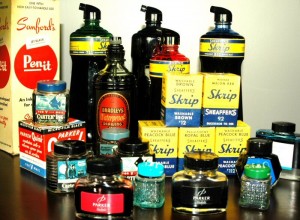
This is just an “inkling” of ThePenMarket.com’s private collection of vintage and modern fountain pen ink. It includes Sanford ink, Sheaffer towers of ink, Carter’s ink and Parker V-mail ink from WWII!
Many people ask me about ink and what they should use in their pens, and it is a great question.
The best rule of thumb is to never, ever use India ink. It has sediments that will clog your pen faster than a diet of Big Macs will clog your arteries. While these pens can be unclogged, it is often a time consuming mess that could potentially damage the pen.
Most of the major name brands make very reliable fountain pen inks that are specially designed to help clean your pen as you write. They might slowly clog your pen over time, especially if you routinely let the ink dry inside your pen. However, they are easier to unclog with a simple flush.
Brands such as Parker, Waterman, Sheaffer, Mont Blanc, Cross, Pelikan, Lamy, Aurora and other major pen makers are always safe bets.
Many modern pen lovers swear by a brand named Private Reserve. These specialty inks offer a zillion different colors that are truely vibrant and beautiful. My trouble with them is that they have always clogged my pens within one or two fills. Personally, I don’t feel they are worth the trouble. Other collectors I talk with insist they never have the trouble with clogging, but I am far from being alone with that issue.
Ink color should also play a role in your decision. Black, blue and blue-black are always safe choices. Red inks have a notorious past for more quickly rotting ink sacs. Even modern red ink shouldn’t be left to set in pens for very long. It is safe to use, but flush your pen when you are done with the ink. Other colors such as greens and purples have a checkered history of ruining ink sacs and pen seals if left in the pen for too long.
One of the many great myths about Mont Blanc pens is that they can only use Mont Blanc inks. The company line is that their inks are specially formulated to preserve and protect their fountain pens. That might very well be true, but most of the other major brand inks are just as safe. Mont Blanc just wants to cash in on their overpriced ink.
Can vintage pens use modern inks? Absolutely. That is virtually all I’ve ever used on my vintage pens.
Can you still use vintage inks on your modern and vintage pens? Certainly! Despite the fact it is a liquid, there are still huge reserves of fresh bottled ink from the 1920s up to present day. Most of the inks in the photo above are from the 1950s and ’60s, and they are still very nice. The #1 vintage ink you want to avoid is “Parker 51 Ink” or “Super Chrome” ink by Parker. It was designed for use in the Parker 51 pens that used latex/silicone ink sacs. The chemicals in the ink very quickly rot traditional rubber ink sacs, diaphragms and piston seals.
Vintage inks can go bad every now and again. When buying vintage ink, check it for “oil slicks,” stuff growing on or in the ink and color separation. Sometimes the old ink loses its pigmentations. Don’t use it if it has any of these issues.
One of my favorite hoaxes in history used vintage inks from the 1880s! In the 1990s, the supposed diary of Jack the Ripper was discovered in London. The diary was to have belonged to one James Maybrick who was never on the radar of “ripperologists.” The initial results on the paper and ink proved they were genuinely from the 1880s. Later tests realized that the diary had been written in the 1950s and cleverly tucked inside a wall of some old building or house, not to be discovered for another 40 years when new owners discovered it during a remodel. I think that makes the hoax all the better, as whoever perpetrated it was likely dead by the time it hit the book stands. That type of patience for a laugh deserves respect.


 Shopping Cart
Shopping Cart




